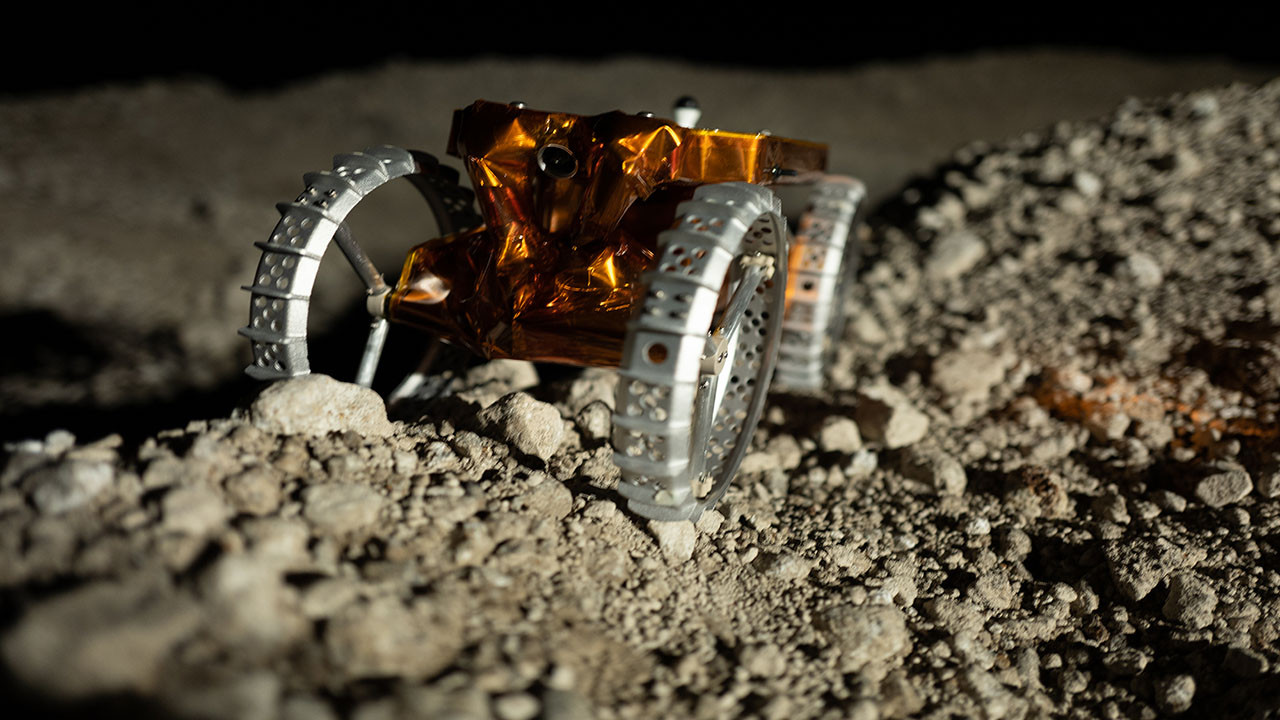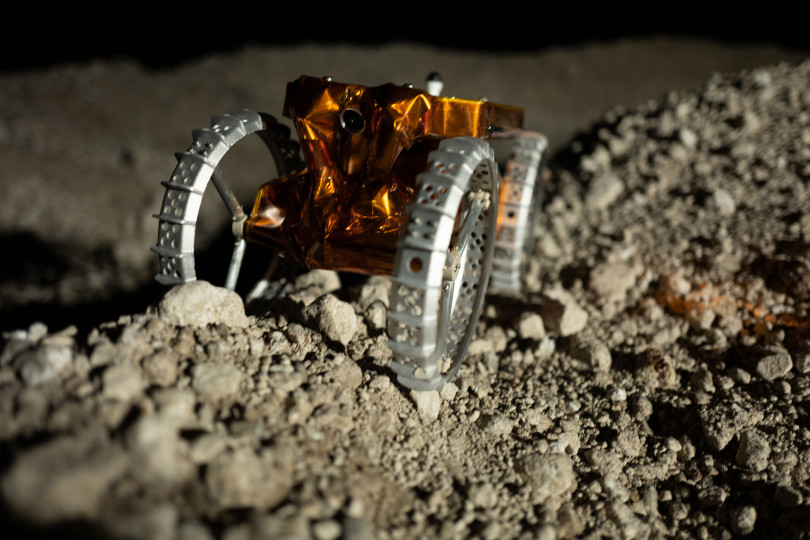Pittsburgh – Even on the Moon, robots need power. Normally, onboard solar panels provide the power, but smaller robots or ones that operate during the lunar night will need a complementary power source. To make this possible two emerging technologies – wireless charging and intelligent autonomous navigation – will be combined. Small robots will be equipped and trained to navigate harsh, unpredictable conditions to get to a wireless docking station in an environment where GPS is not an option.
The National Aeronautics and Space Administration (NASA) recently announced funding for Ultra Fast Proximity Charging for Critical Space Applications, a project where a group of organizations will research and develop technology to intelligently navigate and wirelessly charge small robots for operation on the Moon. Astrobotic, which specializes in space robotics, serves as the Principal Investigator on the project and is joined by Bosch, the University of Washington, WiBotic, and the NASA Glenn Research Center. Bosch and Astrobotic, together with the other partners, developed the key technology and scoped the proposal from the beginning – a nearly two-year process.
The goal of the project, which was awarded $5.8 million through NASA’s Tipping Point program, is to develop a system for magnetic resonance-based wireless charging for use in lunar settings. This includes the precise autonomous navigation of robots to the wireless charging station. The aim is to develop the full system for demonstration by the middle of 2023.
AI and connectivity expertise drives robots
Bosch will contribute its expertise in AI-driven intelligent data analytics and wireless connectivity solutions to the project.
Bosch researchers in Pittsburgh and Sunnyvale, Calif. will focus on intelligent processing capability that will enable autonomous navigation of robots on the Moon’s surface. The project showcases Bosch’s expertise in AIoT - when Artificial Intelligence meets the Internet of Things. Bosch is focused on connecting things to get data, processing the data and using AI to obtain information. The information learned can improve products and add value.
“Navigating a robot on the Moon is not the same as navigating a robotic vacuum through your home or navigating a self-driving car on the road,” said Dr. Samarjit Das, leader of the Intelligent Internet of Things Group at Bosch Research in Pittsburgh. “First of all, radio-based terrestrial localization solutions are not available on the Moon. In addition, unpredictable lunar terrain and dust make it even harder to perform precise navigation using visual cues alone. Thus, we will need intelligent fusion and perception on the robot’s multi-sensory data to solve this unique challenge on the harsh environment of the Moon.”
Bosch will study and develop multi-sensor fusion technologies that could include video, inertial measurement units (IMU), radio frequency (RF) movements and vibration sensors on the small robots to create complementary modalities that enable highly-precise navigation. The first specific navigation is guiding the robot to a docking station for wireless charging.
Featuring a modular, scalable shoebox-sized rover
The robot featured in the project will be Astrobotic’s CubeRover, an ultralight, rechargeable planetary rover developed in collaboration with the NASA Kennedy Space Center. The rover is roughly the size of a shoebox and weighs fewer than five pounds. It can carry its own payload or team up with other CubeRovers to scout for larger rovers and landers.
Bosch and Astrobotic previously collaborated on SoundSee, a module that uses artificial intelligence to analyze audio data, now in orbit aboard the International Space Station (ISS).
Wireless – a new power source for lunar robots
The CubeRovers will need power. Wireless charging expertise will come from WiBotic, a Seattle company that specializes in advanced wireless charging and power optimization solutions for the rapidly expanding ecosystem of aerial, mobile and marine robots.
WiBotic will also be supported by the University of Washington, where the topic of wireless charging has been studied for a number of years under the leadership of Dr. Joshua Smith, who leads the Sensor Systems Laboratory. Dr. Smith has been a long-time collaborator with Bosch Research in Silicon Valley in the area of wireless charging.
The combined team will develop a lightweight, ultra-fast proximity charging solution, comprised of a base station and power receiver to enable critical space applications.
System testing to simulate space
Results of the collaboration will be tested at NASA’s Glenn Research Center (GRC) in Cleveland. There, the CubeRover with intelligent navigation and wireless charging technology will be deployed in GRC’s Space Power Facility, the world's largest thermal vacuum chamber. Tests will showcase how the system can enable lunar night survival for small-scale robotics.
Zita Hella Varga
Phone: +36 70 667-6374
The Bosch Group is a leading global supplier of technology and services. It employs roughly 400,000 associates worldwide (as of December 31, 2019). The company generated sales of 77.7 billion euros in 2019. Its operations are divided into four business sectors: Mobility Solutions, Industrial Technology, Consumer Goods, and Energy and Building Technology. As a leading IoT provider, Bosch offers innovative solutions for smart homes, Industry 4.0, and connected mobility. Bosch pursuing a vision of mobility that is sustainable, safe, and exciting. It uses its expertise in sensor technology, software, and services, as well as its own IoT cloud, to offer its customers connected, cross-domain solutions from a single source. The Bosch Group’s strategic objective is to facilitate connected living with products and solutions that either contain artificial intelligence (AI) or have been developed or manufactured with its help. Bosch improves quality of life worldwide with products and services that are innovative and spark enthusiasm. In short, Bosch creates technology that is “Invented for life.” The Bosch Group comprises Robert Bosch GmbH and its roughly 440 subsidiary and regional companies in 60 countries. Including sales and service partners, Bosch’s global manufacturing, engineering, and sales network covers nearly every country in the world. The basis for the company’s future growth is its innovative strength. Bosch employs some 72,600 associates in research and development at 126 locations across the globe, as well as roughly 30,000 software engineers.
The company was set up in Stuttgart in 1886 by Robert Bosch (1861-1942) as “Workshop for Precision Mechanics and Electrical Engineering.” The special ownership structure of Robert Bosch GmbH guarantees the entrepreneurial freedom of the Bosch Group, making it possible for the company to plan over the long term and to undertake significant upfront investments in the safeguarding of its future. Ninety-four percent of the share capital of Robert Bosch GmbH is held by Robert Bosch Stiftung GmbH, a charitable foundation. The remaining shares are held by the Bosch family, by a corporation owned by the family, and by Robert Bosch GmbH. The majority of voting rights are held by Robert Bosch Industrietreuhand KG, an industrial trust. The entrepreneurial ownership functions are carried out by the trust.
Additional information is available online at www.bosch.com, www.iot.bosch.com, www.bosch-press.com, www.twitter.com/BoschPresse



